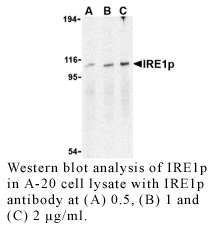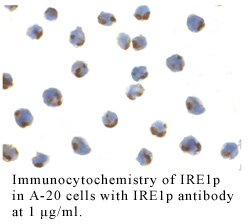Anti-Human IRE1p (CT)
Data
- -
- -
Antibody DetailsProduct DetailsReactive Species Human Host Species Rabbit Immunogen PN:I-484 Product Concentration 0.5 mg/ml Formulation This polyclonal antibody is formulated in phosphate buffered saline (PBS) pH 7.4 containing 0.02% sodium azide as a preservative. Storage and Handling This polyclonal antibody is stable for at least one week when stored at 2-8°C. For long term storage, aliquot in working volumes without diluting and store at –20°C in a manual defrost freezer. Avoid Repeated Freeze Thaw Cycles. Country of Origin USA Shipping Next Day Ambient RRIDAB_2830699 Each investigator should determine their own optimal working dilution for specific applications. See directions on lot specific datasheets, as information may periodically change. DescriptionDescriptionSpecificity Rabbit Anti-Human IRE1p recognizes an epitope near the C-terminus of Human, Mouse and Rat IRE1p. This polyclonal antibody was purified using affinity chromatography. Background Accumulation of malfolded proteins in the endoplasmic reticulum (ER) activates the unfolded protein response (UPR) and the upregulation of the ER molecular chaperones GRP78 and GRP 94.1,2 These proteins are normally bound to ER transmembrane proteins such as IRE1p and ATF63,4 but ER stress causes their dissociation. This allows IRE1p, a serine-threonine protein kinase to transduce the unfolded protein signal from the ER to the nucleus. IRE1p also has an endoribonuclease activity that is required to splice X-box binding protein (XBP1) mRNA converting it to a potent UPR transcriptional activation. Depletion of IRE1p through the expression of a dominant negative form of IRE1p has no effect on transfected cells, but cell death via apoptosis occurs under stress conditions that cause unfolded proteins to accumulate in the ER. Two alternatively spliced transcript variants encoding different isoforms have been found for this gene. PubMed References & Citations1. Takeda, K. et al. (2003) Annu. Rev. Immunol. 21:335 2. Lee, AS. (2005) Methods 35:373 3. Bertolotti, A. et al. (2000) Nat. Cell Biol. 2:326 4. Shen, J. et al. (2002) Dev. Cell 3:99 5. Lee, K. et al. (2002) Genes Dev. 16:452 6. Miyoshi, K. et al. (2000) Res. Mol. Brain Res. 85:68 Technical ProtocolsCertificate of Analysis |
Related Products
- -
- -
Prod No. | Description |
|---|---|
I-462 | |
I-463 | |
I-464 | |
I-485 | |
I-486 | |
I-484 |




